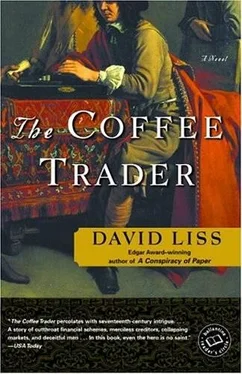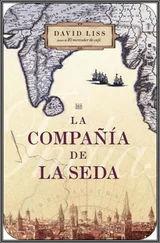“He owes me some money,” she explained, once her cousin had walked away. “I agreed to take a little of this as payment, and I wanted to give you something to think about.”
Miguel looked in the bag, which contained perhaps a dozen handfuls of brownish berries.
“Coffee,” Geertruid said. “I’ve had Crispijn cook the berries for you because I know a Portuguese hidalgo cannot be expected to roast his own fruit. You merely need grind them to a powder, which you mix with hot milk or sweet water, then filter out the powder if you like, or just let it settle. Don’t drink too much of the powder itself, lest you agitate your bowels.”
“You did not mention bowel agitation when you sang its praises.”
“Even nature’s greatest glories can harm if taken in the wrong dose. I wouldn’t have said anything, but a man with uneasy bowels makes a poor business partner.”
Miguel let her kiss him again, and then he squeezed through the tavern and stepped out into the misty cool of the late afternoon. After the stench of the Golden Calf, the salty air off the IJ felt as wonderfully cleansing as the mikvah, and he let the mist fall on his face for a moment until a boy, not six years old, began to pull on his sleeve and weep piteously about his mother. Miguel tossed the boy a half stuiver, already relishing the wealth coffee would bring: freedom from debt, his own home, a chance to marry once more, children.
In an instant he chastised himself for indulging in these fancies in light of the day’s setbacks. Another thousand guilders in debt. He owed three thousand already throughout the Vlooyenburg, including fifteen hundred to his brother, borrowed after the sugar market collapsed. He’d allowed the Bankruptcy Office at the Town Hall to settle his debts to Christians, but the Jews of his neighborhood ordered their own accounts.
High tide had begun to move in, and the waters had crept up beyond the Rozengracht to slick the streets. Across town, in his brother’s house, the cavernous cellar where Miguel now slept at night would soon begin its own flooding. That was the price of living in a city built in the water upon piles, but Miguel now thought nothing of the discomforts of Amsterdam that had troubled him when he had first arrived. He hardly noticed the dead-fish stench of canal water or the squish of walking on wet ground. Dead fish was the perfume of Amsterdam ’s riches, the squish of water its melody.
The prudent thing would be to go home at once and write a note to Geertruid explaining that the risks of working with her were too great and might well lead to his ruin. But he would never free himself from debt with prudence, and ruin was already upon him. Only a few months ago his sugar had crammed canal-side warehouses; he had strutted across the Vlooyenburg like a burgher. He had been ready to set the loss of Katarina behind him, to take a new wife and have sons, and the marriage brokers had clawed at one another to gain access to him. But now he was in debt. His standing had collapsed to worse than nothing. He received threatening notes from a man who must be mad. How could he turn his fortune if not by doing something daring?
He had taken risks all his life. Was he to stop because he feared the arbitrary power of the Ma’amad, those men who, entrusted to uphold the Law of Moses, valued their power above God’s Word? The Law had nothing to say about Dutch widows. Why should Miguel avoid making his fortune with one?
He might have tried to conduct a little more business that day, but he suspected his agitation would lead to nothing productive, so instead he went to the Talmud Torah synagogue for afternoon and evening prayers. The now-familiar liturgy soothed him like spiced wine, and by the time he left he felt renewed.
As he walked the short distance from the synagogue to his brother’s house, keeping close to canal-side houses to elude both thieves and the Night Watch, Miguel listened to the click of rat claws on the wooden planks stretched over the sewers. Coffee, he chanted to himself. He hardly needed a week to give Geertruid his answer. He only needed time to convince himself that any scheme he embarked on with her would not complete his ruin.
from
The Factual and Revealing Memoirs of Alonzo Alferonda
My name is Alonzo Rodrigo Tomas de la Alferonda, and I brought the drink called coffee to the Europeans-gave birth to its usage there, one might say. Well, perhaps I phrase that too strongly, for coffee surely would have made its murky way without my efforts. Let us say instead that I was the man-midwife who eased its passage from obscurity into glory. No, you will say, that was not me either; it was Miguel Lienzo who did that. What role, then, could Alonzo Alferonda have played in the triumph of this great fruit? More than is generally believed, I assure you. And for those who say I made nothing but mischief, that I thwarted and hindered and harmed rather than advanced, I can only say I know more than my detractors. I was there-and you, in all likelihood, were not.
My true name is Avraham, as was my father’s name and his father’s. All firstborn Alferonda men have secretly called their firstborn sons Avraham for as long as Jews have had secret names, and before that, when the Moors ruled Iberia, they called themselves Avraham openly. For much of my life, I was not permitted to speak my name aloud except in dark rooms, and then only in whispers. Those who would question my actions should remember that. Who would you be today, I ask you who judge me harshly, if your own name was a secret whose revelation could cost your life and the lives of your friends and family?
I was born in the Portuguese city of Lisbon to a family of Jews who were not allowed to pray as Jews. We were called New Christians, or Conversos, for our ancestors had been made to take the Catholic faith or surrender their property-and often their lives. Lest we face torture and ruin and perhaps even death, we prayed publicly as Catholics, but in shadows and in cellars, in secret synagogues that moved from house to house, we prayed as Jews. Prayer books were rare and precious to us. In the light of day a man might measure his wealth in gold, but in the dark of those dark rooms, we measured wealth in pages and in knowledge. Few among our number could read the Hebrew of what few books we had. Few knew the right prayers for the holy days or for Shabbat.
My father knew, or at least he knew some. Having spent the first part of his childhood in the East, he had grown up among Jews unrestrained by the law from practicing their religion. He had prayer books that he lent out freely. He owned a few volumes of the Babylonian Talmud, but he knew no Aramaic and could make little sense of its pages. The Secret Jews in Lisbon came to him for instruction in the rudiments of reading the holy tongue, of the prayers for Shabbat, of fasting on fast days and feasting on feast days. He taught them to eat out-of-doors during Succoth, and of course he taught them to drink themselves to a merry stupor on Purim.
Let me be direct: my father was no holy man or sage or saint. Far from it. I admit this freely and think it no insult to his name. My father was a trickster and a cheat; in his hands, trickery and cheating were beautiful and marvelous things.
Because he was schooled in the ways of our faith-no scholar, mind you, but simply a man with an education-my father was tolerated among the Secret Jews of Lisbon in ways he might not have been otherwise, for he brought far more attention upon himself than was wise for any New Christian. Wherever merchants with a few spare coins might find themselves, my father would be there with his potions to lengthen life, improve virility, or cure any malady. He knew tricks with cards and balls and dice. He could juggle and rope-dance and tumble. He knew how to train dogs to add and subtract simple numbers and how to train cats to dance on their hind legs.
Читать дальше












